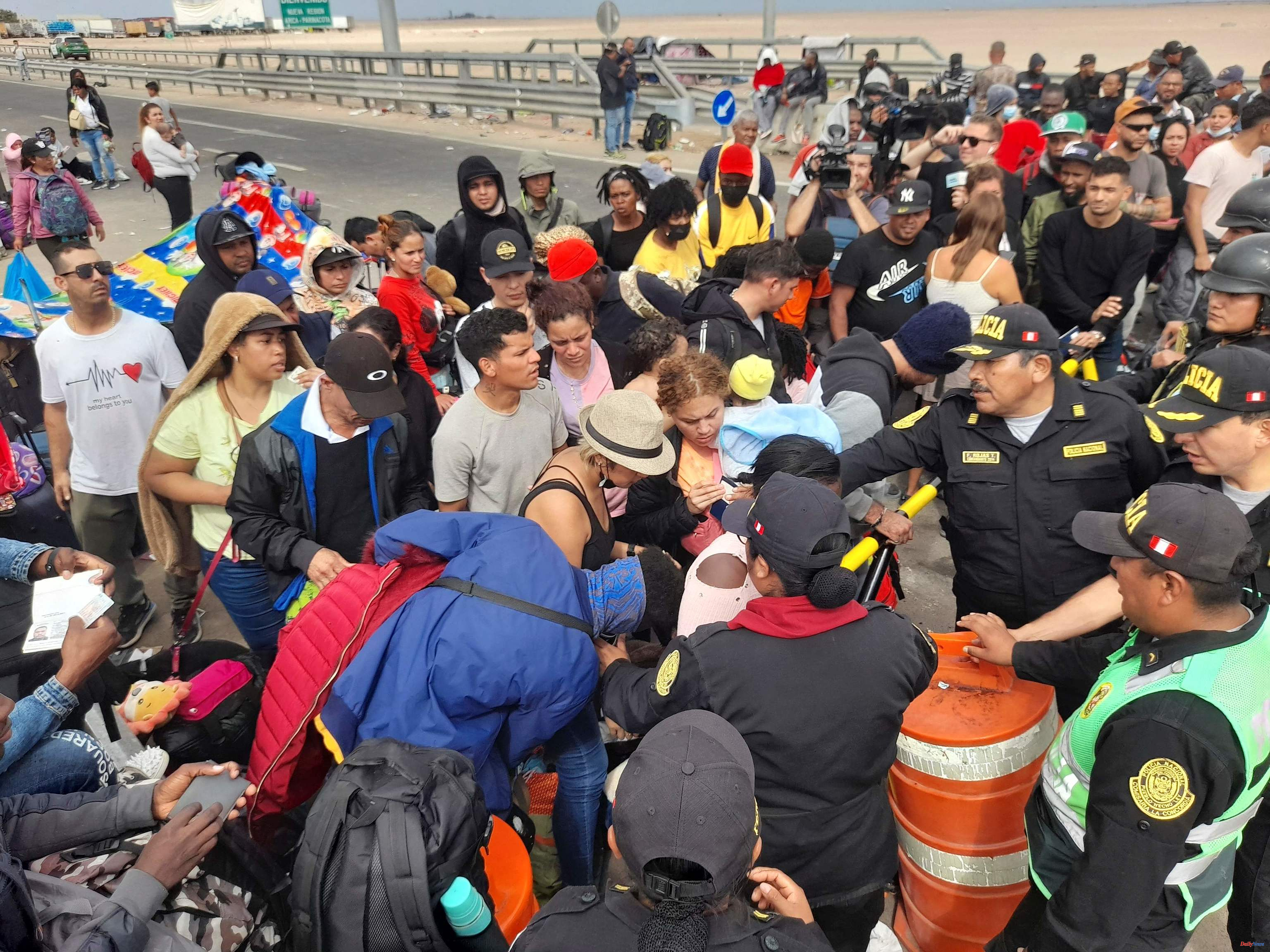The immigration measures ordered by Dina Boluarte have raised diplomatic tension with neighboring Chile and unleashed the indignation of the large Venezuelan community. The Peruvian president decreed a state of emergency on its borders with Ecuador, Colombia and Chile and ordered that they be militarized before the arrival of emigrants from the south, but above all she pointed out the "culprits" of the prevailing insecurity in the Andean country: " Those who commit assaults, robberies and other criminal acts on a daily basis are foreigners (referring to Venezuelans and Haitians). That is why we have to reformulate the Aliens Law, look at this issue of emigration. Unfortunately they are the ones who are committing these acts."
Peru became the first country to open its doors wide to Venezuelan emigrants at the beginning of its great diaspora, during the presidency of the moderate Juan Pablo Kuczynski (2016-2018), which his successor Martín Vizcarra and Francisco Sagasti maintained until the assumption of Pedro Castillo in 2021. Those were other times, when the Lima Group confronted the powerful Chavismo. Already in the electoral campaign, the leftist teacher applied a turn towards emigration and in his most reactionary speech various threats emerged against Venezuelans, who already number 1,300,000 in Peru, 800,000 of them in the capital. Lima has become the city in the world with the most emigrants of this nationality outside of Venezuela.
"I am going to take the bull by the horns", redounded the Prime Minister, Alberto Otárola, who demanded that the Chilean President, Gabriel Boric, "solve their problems and not throw them (emigrants) towards another country". The Peruvian authorities allege that those who try to enter their country do not carry documentation.
The offensive statements by a Peruvian mayor in the border area to President Boric ("We cannot allow an unnameable and irresponsible person to be transferring problems to the border") precipitated calls for attention to the ambassadors of both countries in the two South American capitals. and the consequent protest notes.
"In recent days, authorities from Colombia, Ecuador, Peru and Chile have held, without success, virtual meetings to try to agree on a collective response to the situation. Diplomatic relations between Latin American countries are not having a good time," he revealed. internationalist Mariano de Alba, senior adviser to the Crisis Group. The Boric government has raised the need to create a humanitarian corridor so that migrants stranded at the border can return to their country.
For two weeks, Venezuelan camps have grown on the border between Peru and Chile, with the presence of Haitians and even Vietnamese, who want to continue their migration north. The National Police fired into the air several times before an avalanche of people loaded with suitcases, including children, who wanted to cross the border and enter Peru.
This is the same humanitarian crisis caused by the Chavista revolution that is repeated today in different parts of the continent and that has no sign of ending: Venezuelans continue to flee from a country where the minimum wage for millions of them does not reach 20 cents on the dollar. up to date.
"We already have the humanitarian problem and it is going to increase," warned the UN Refugee Agency (UNHCR). Amnesty International, for its part, denounced "the absolute precariousness in which these people find themselves as a result of cruel and dehumanizing policies, which violate international standards and the laws of Peru and Chile for the protection of people."
Not only in these two countries, but also in Ecuador and Colombia, complaints against criminal acts carried out by Venezuelans have grown. In Lima, a former military man, Sergio Tarache, doused his former Peruvian partner with gasoline and burned her alive in a busy square in the center of the capital. A night watchman from Lima also died from a shot to the neck by a robber. Both events went viral on social networks and put even more pressure on the government, as also happened in Chile with the death of a police officer.
The famous Tren de Aragua, a transnational group of criminals directed from the Venezuelan prison of Tocorón by its leader, El Niño Guerrero, has been deployed in several countries in the region. This powerful mafia, which was born in the bowels of the revolution, participates in kidnappings, homicides and prostitution, which leads it to maintain a constant presence before public opinion.
However, the real figures flatly rule out the theses of increased insecurity due to emigrants. According to UNHCR, of a national total of 100,000 inmates, only 2,400 Venezuelans currently appear, a lower percentage than that of its population in the Andean country.
Venezuelan and international organizations have repeatedly warned against outbreaks of xenophobia and the stigma that grows among some media and in sectors of the population.
"Since the Venezuelan refugee crisis began, Peru has systematically broken its own law, playing crazy and denying these people the protection status that corresponds to them," reiterated Peruvian analyst Alonso Gurmendi.
According to the criteria of The Trust Project












